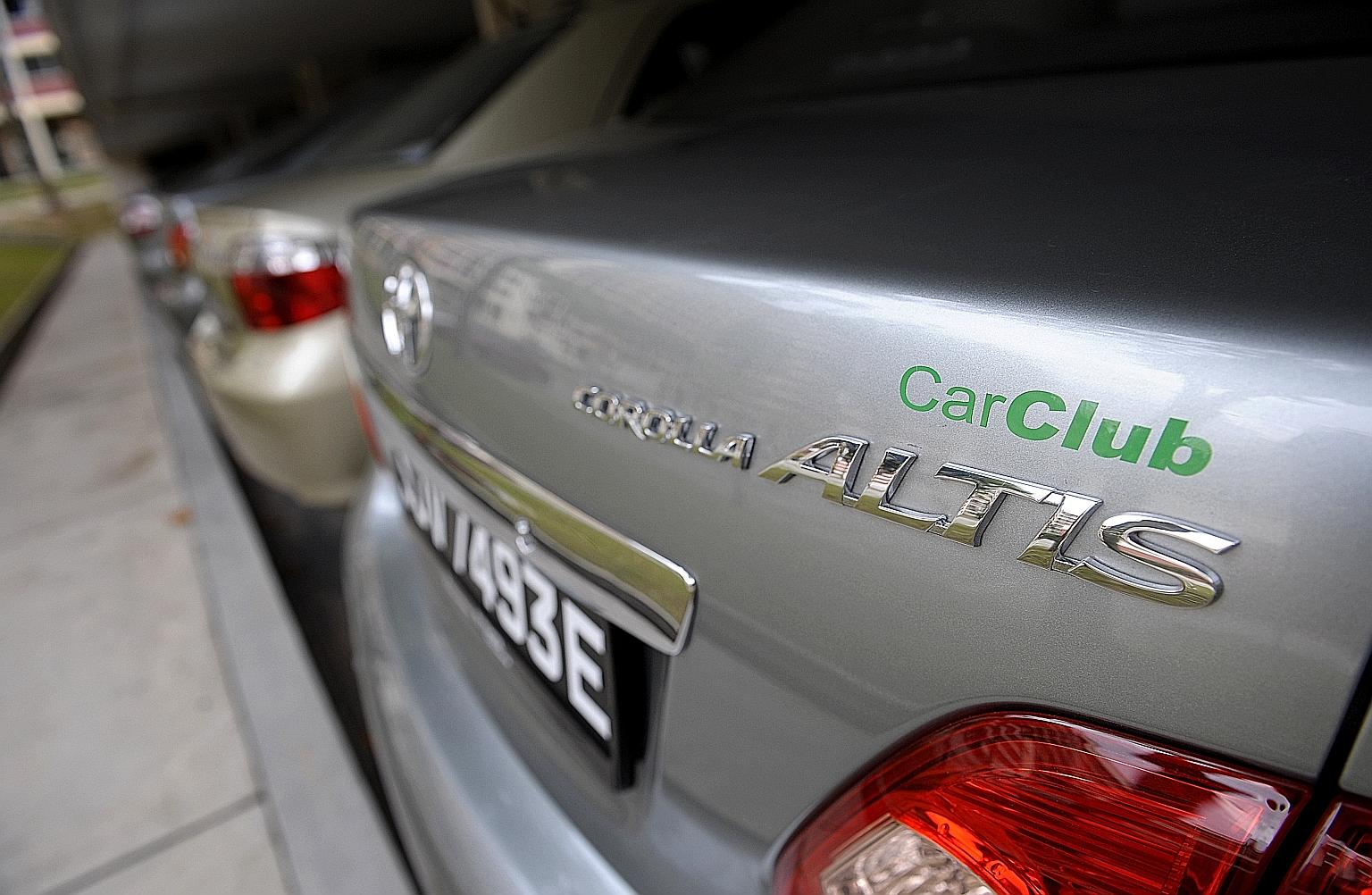Cars for sharing raring to grow
High COEs, better public transport make it attractive, but 3rd party taxi apps pose limit to trend
Sign up now: Get ST's newsletters delivered to your inbox

Among the three main car-sharing operators, Car Club and WhizzCar currently have about 300 cars in total, while Smove is expected to boost its fleet to about 200 by mid-year.
ST FILE PHOTO
The number of cars available for car-sharing users is set to increase as more people buy into the concept, although observers say the growing popularity of third-party taxi apps might limit the trend.
Among the three main car-sharing operators, Car Club and WhizzCar currently have about 300 cars in total, while Smove is expected to boost its fleet to about 200 by mid-year.
The total number of shared cars owned by the three operators is expected to rise to about 650, or possibly more, in a year's time, with each firm planning to expand its fleet to meet growing demand.
Car Club estimates its fleet will grow from about 200 now to about 300 by next March, while WhizzCar intends to increase its fleet of about 100 by 40 per cent this year.
Smove declined to give details of its current fleet size nor how much more it could grow. But founder Tom Lokenvitz believes the number of cars and potential of car sharing goes well beyond the fleet of 200 vehicles that his company will have by the middle of this year.
Car sharing is a pay-as-you-drive transportation service. It differs from conventional car rental as it offers greater flexibility to access and use, and the hirer pays only for the time and mileage incurred.
-
Main operators
The three main car-sharing operators with their own fleets in Singapore are Car Club, WhizzCar and Smove.
Car Club
Singapore's longest-serving car-sharing operator began life in 1997 as NTUC Income's car-sharing cooperative. In 2010, when it decided to quit the car-sharing business it pioneered in Singapore, the business was bought over by former employees and continued operations under its current name, Car Club. It has 200 cars and plans to increase this to 300 in a year's time.
WhizzCar
It was started in 2003 by Popular Rent A Car, a car rental company that began in 1996. WhizzCar will be increasing its fleet of about 100 cars by 40 per cent to cope with increased demand. This, the firm believes, is a result of the high certificate of entitlement prices in the past few years.
Smove
The latest operator to enter the scene, Smove started in late 2012 with a fleet made up entirely of electric vehicles. Due to the insufficient infrastructure available to support its electric vehicle fleet, Smove has since changed its fleet to fuel-efficient cars. It is expected to bump up its fleet to about 200 cars by the middle of the year.
Operators of the service said much of the demand has been fuelled by the high cost of owning a car, changing perceptions of ownership as well as increased awareness about car sharing and how it functions.
Car Club vice-president Gary Ong said: "We have worked towards removing doubts about the system by continually engaging customers through marketing campaigns, which I feel has increased demand."
Transport academic Professor Lee Der Horng from the National University of Singapore reckons that people here have become more rational about car ownership, partly because of new MRT lines and bus routes that make commuting by public transport more convenient.
He said: "As long as I can fulfil my commuting needs using public transport, I don't mind giving up car ownership, as I can reap more financial benefits. Car sharing serves to complement public transport, and allows those who do not own cars to go to places not easily accessible by public transport yet."
For new Car Club member Chua Sook Sin, 63, car sharing is a makeshift solution after selling his car.
He finds current certificate of entitlement premiums too high to buy a new car. He said: "I have a family of five, and that restricts us in taking a taxi. Car sharing is thus a logical choice."
WhizzCar managing director Ho Kok Keesaid about 700 members registered with them over the past three years, without any active promotional campaigns.
WhizzCar now has about 2,500 members, while the combined membership of the three firms islandwide is approximately 20,000.
The push towards car sharing dovetails with the Government's efforts to reduce car ownership and shift more people to public transport. Several government agencies are rolling out plans to boost car sharing.
The Housing Board has identified an additional 300 carparks that can be used for car sharing, on top of the 110 that are now actively used. Car-sharing operators also have the option to expand their services in new HDB Build-To-Order projects.
Meanwhile, the Land Transport Authority (LTA) and Economic Development Board are now finalising details to pilot a nationwide electric vehicle car-sharing scheme.
This programme will test the viability of fleet-based electric vehicle operations and help determine the optimal charging infrastructure to support the widespread use of electric vehicles, said an LTA spokesman.
Prof Lee said the increased demand, however, will taper off. "I don't think the current trend will keep going... As taxis and other private services like Uber and GrabCar have a more dynamic pricing, car sharing will continuously face a lot of competition," he said.


